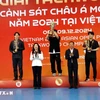The session is scheduled to examine Vietnam’s application for UNESCO’s recognition of the Nghe Tinh Vi-Giam folk singing as part of the intangible cultural heritage of humanity, together with 45 applications from other countries.
During the session from November 24-28, the committee will also consider eight dossiers seeking recognition as cultural heritage in need of urgent safeguarding.
Participants are expected to review national reports on the current status of those on the List of Intangible Cultural Heritage in Need of Urgent Safeguarding as well as reports on the use of international assistance from the Intangible Cultural Heritage Fund and the selection to the Register for Best Safeguarding Practices.
A member of Vietnam’s Cultural Heritage Council said the dossier on Vi-Giam singing was submitted to the UNESCO in March this year.
This type of folk singing is popular in nearly 260 villages in the central provinces of Nghe An and Ha Tinh.
The two provinces have 51 singing clubs with over 800 vocalists, many of whom are actively preserving the folk music.
Vi-Giam folk music, estimated to have 15 tunes of Vi and 8 airs of Giam, is a repartee sung while working. It reflects the work, cultural life and feelings of the residents in the central coastal provinces.
Vietnam now has eight cultural practices recognised by UNESCO as part of the world intangible heritage, namely Hue's royal court music, Gong space culture in Tay Nguyen (Central Highlands), the northern province of Bac Ninh's love duet singing, the Giong festival, Ca Tru ceremonial singing, Xoan singing, Don Ca Tai Tu music and the worship of Hung Kings.-VNA



















